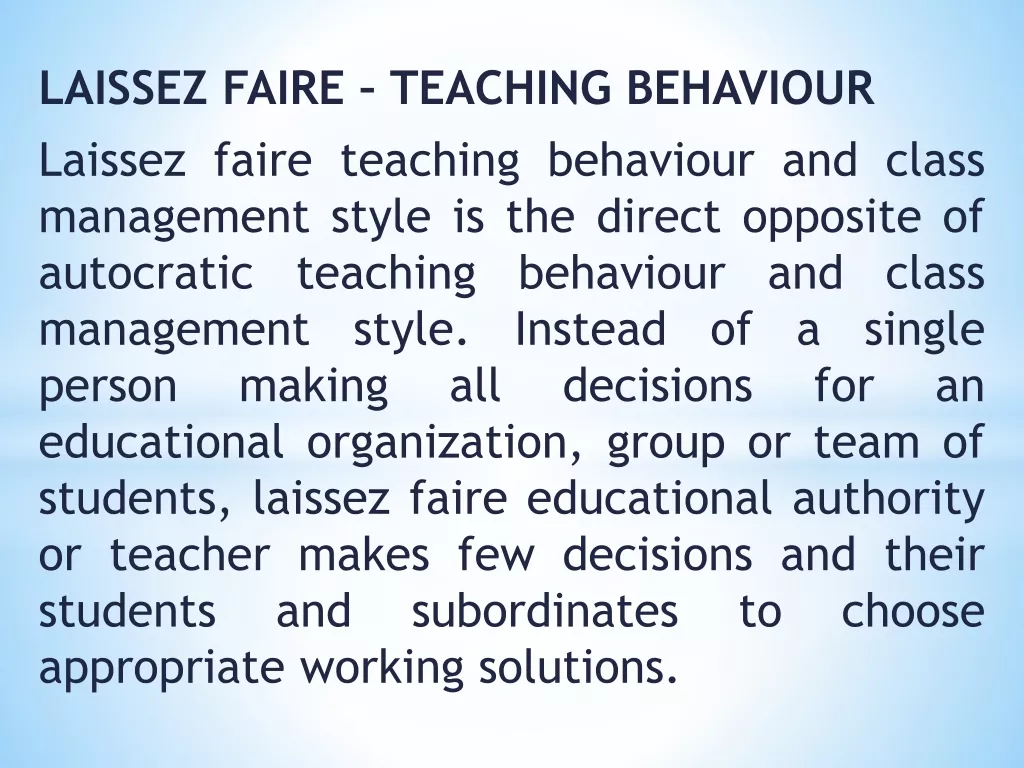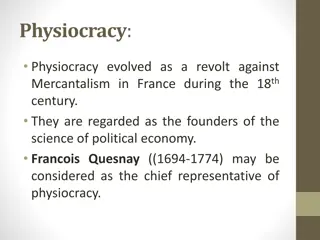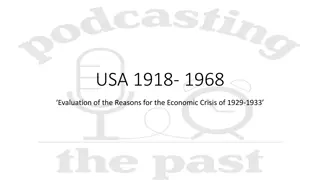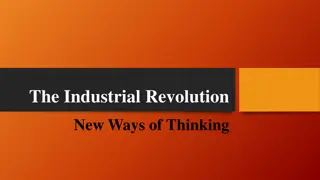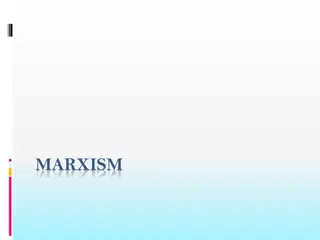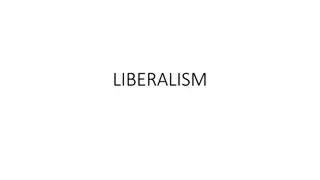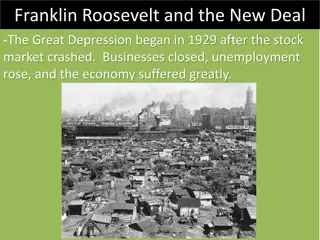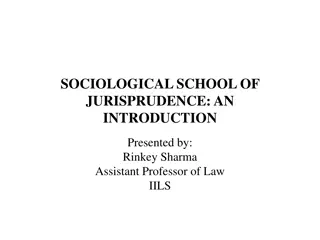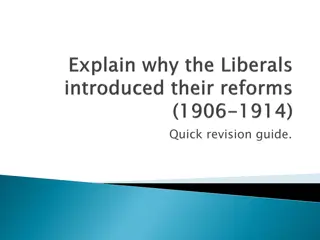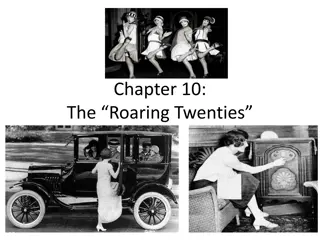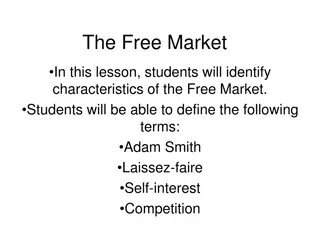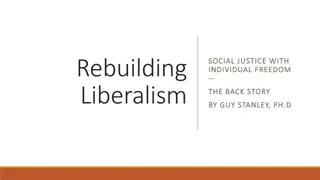Laissez Faire Teaching Styles
Laissez-faire teaching allows students to work independently without excessive oversight. This method emphasizes student autonomy and individualized instruction. The teacher's role is hands-off, promoting student self-reliance. This approach benefits self-motivated and capable learners.
3 views • 11 slides
Physiocracy: The Economic Philosophy of Francois Quesnay
Physiocracy emerged as a response to Mercantilism in 18th century France, with Francois Quesnay as a key figure. The basic principles of Physiocracy include the belief in natural order, advocacy of laissez-faire, emphasis on agriculture as the only productive occupation, support for private property
4 views • 14 slides
salle évènementielle personnalisable Yaoundé
\u00c0 la recherche d'un espace \u00e9v\u00e9nementiel personnalisable \u00e0 Yaound\u00e9 ? Explorez la beaut\u00e9 et le charme de Sallemajesteuse.com pour faire de votre \u00e9v\u00e9nement sp\u00e9cial un moment inoubliable.\n\n\n\/\/sallemajesteuse.com\/fr\/
8 views • 1 slides
Evaluation of Economic Crisis Causes in 1929-1933: Republican Policies and Factors
The economic crisis of 1929-1933 in the USA was influenced by various factors, including Republican government policies favoring laissez-faire capitalism, overproduction of goods, weaknesses in the banking system, international economic issues, and the Wall Street Crash. The prosperity of the 1920s,
0 views • 33 slides
The Industrial Revolution and Laissez-Faire Economics: Perspectives on Population and Poverty
Industrial revolution led to new ways of thinking, including population theories by Thomas Malthus and economic concepts like laissez-faire advocated by thinkers such as Adam Smith and David Ricardo. Malthus and Ricardo held bleak views on poverty and population growth, suggesting limited government
1 views • 17 slides
Leadership Styles and Theories: An Overview
Explore the concept of leadership styles and theories, focusing on the different types of leadership styles such as autocratic, democratic, and laissez-faire. Learn about the components of a manager's leadership style, including motivation approaches, decision-making styles, and areas of emphasis in
4 views • 24 slides
Marxism and Capitalism
Marxism is a body of social, political, and economic thought derived from the works of Karl Marx and Friedrich Engels, focusing on the analysis of capitalism. Capitalism is an economic system where private individuals own goods and services based on market supply and demand. The purest form of capit
0 views • 25 slides
Liberalism: Key Ideas and Historical Context
Liberalism, a prominent political ideology, emerged in the 19th century and is closely linked to capitalism. It stands against absolutism and feudal privileges, advocating for individualism, freedom, reason, equality, toleration, consent, and constitutionalism. The evolution of liberalism emphasized
2 views • 18 slides
Fundamental Principles of Public Finance
Public Financial Management involves the management of public funds, focusing on goals, objectives, and ideologies shaping government functions. Concepts such as laissez-faire and socialism influence how governments provide services, enforce laws, protect private interests, and promote social welfar
0 views • 86 slides
Franklin D. Roosevelt and the New Deal During the Great Depression
The Great Depression of 1929 led to high unemployment, closed businesses, and economic suffering. President Hoover's laissez-faire policies failed to address the crisis adequately. In the 1932 election, FDR introduced the New Deal with a focus on Relief, Recovery, and Reform to combat the Depression
2 views • 13 slides
Sociological School of Jurisprudence: An Introduction
Sociology studies human relations within society while jurisprudence focuses on law. The Sociological School of Jurisprudence emphasizes the interconnection between law and society. It emerged in response to the doctrine of Laissez Faire during the Industrial Revolution, advocating for a balance bet
1 views • 6 slides
Welfare Reforms in the 19th Century: A Historical Overview
In the 19th century, poverty was often blamed on individuals, leading to a laissez-faire approach by the government. Key figures like Charles Booth and Seebohm Rowntree conducted insightful studies on poverty, highlighting the need for welfare reforms. The emergence of genuine concern for the poor a
0 views • 8 slides
The Roaring Twenties: Politics and Social Issues in 1920s America
The 1920s in America marked a period of significant political and social change. The nation saw a return to conservatism and isolationism after World War I, with the Republican Party in control. Nativism was on the rise, leading to restrictive immigration laws and controversial events like the Sacco
0 views • 22 slides
The Free Market Economy
Students will learn about the characteristics of the Free Market, defining terms like Adam Smith, Laissez-faire, self-interest, and competition. The lesson explores how markets function, the concept of laissez-faire, and Adam Smith's idea of the Invisible Hand in the economy.
0 views • 15 slides
Leadership Competencies: Types of Leaders and Activities
Explore the concept of leadership, identifying different types of leaders - Laissez-Faire, Autocratic, Democratic, and Paternalistic. Learn about their characteristics and how they handle various situations. Engage in group discussions and activities to practice different leadership styles, enhancin
0 views • 13 slides
Italian Emigration: A Historiographical Analysis, 1860-1960
Italian emigration between 1860 and 1960 saw significant numbers of Italians leaving the country for various destinations, particularly the Americas. The emigration trend reflected the failures of the Liberal state and highlighted issues with the laissez-faire approach, leading to challenges in addr
0 views • 39 slides
Rebuilding Liberalism: Social Justice with Individual Freedom
The book "Rebuilding Liberalism" by Guy Stanley, Ph.D., challenges neo-liberalism's laissez-faire approach and emphasizes the importance of civil society in achieving social justice and individual freedom. It outlines how the state influences markets, money, and law, and highlights the need for demo
0 views • 20 slides
Pourquoi engager un saxophoniste pour votre mariage
Offrir une exp\u00e9rience m\u00e9morable aux gens est l\u2019une des choses les plus gratifiantes que seuls quelques chanteurs peuvent faire. Et le tout est encore meilleur avec un instrument comme le saxophone. Le saxophoniste professionnel mariage
1 views • 3 slides
